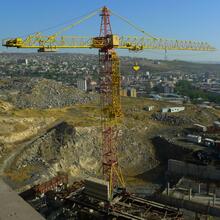EU-OSHA Blog
Back to latest postsGuidance for competence in tower crane examinations

The Consolidated Use of Work Equipment Directive 2009/104/EC requires tower and mobile cranes to be examined to detect actual and potential defects and weaknesses, and for such to be reported and acted upon so as to ensure safe crane operation. This requires an examiner who is both competent and impartial to carry out the examination.
Guidance has been developed by a tripartite working group with representation from employees, employers and governments. The purpose of this guidance is to advise on appropriate minimum standards to ensure the competence (and impartiality) of persons carrying-out periodic and assembly examinations of tower and mobile cranes.
Members of the triparite group were provided by the MACHEX group of the Senior Labour Inspectors Committee (SLIC) and the tripartite Advisory Committee on Safety and Health at Work (ASCHW). Also represented was the European Confederation of Inspection Organisations (CEOC).
A number of Member States have National legislation which specifies registration requirements for examiners and requirements for verification of their competence by a recognised or accredited third party. This guidance is not meant to replace those requirements but assist in assessing the competence of crane examiners. It is anticipated that such will assist the mutual recognition of competence and the free movement of services, provided by competent examiners of tower and mobile cranes, across the EU.
This guidance does not recommend specific routes for achieving competence such as naming specific qualifications or training courses. It is recognised by the group that such clarification is a subsidiary matter, however it may be beneficial if guidance was available and so it could be a topic for future work.
The Senior Labour Inspectors Committee was given formal status by the European Commission in 1995 with a mandate to give its opinion to the Commission, either at the Commission’s request or on its own initiative, on all problems relating to the enforcement by the Member States of Community law on health and safety at work.
The role of the Advisory Committee on Safety and Health at Work (ACSHW) is to assist the Commission in the preparation and implementation of decisions taken in the field of safety and health at work and to facilitate cooperation between national administrations, trade unions and employers' organisations.
The European Confederation of Inspection Organisations (CEOC) represents independent inspection and certification organisations.
The guidance is available in English, French, and German